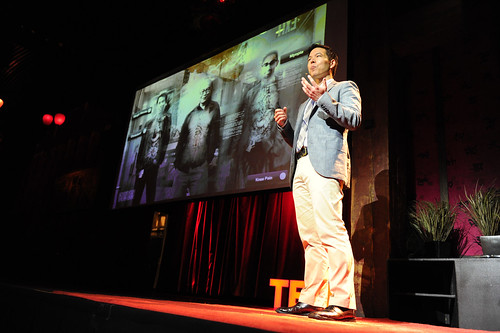
Onyx Ashanti. Photo: James Duncan Davidson
Two more in our continuing series of Q&As with Full Spectrum speakers:
The astonishing Onyx Ashanti took the stage with an iPhone strapped to his arm, a brick-size controller in each hand and with a tube extending from his mouth like scuba gear — and proceded to improvise beats and loops and an orchestra of instrumentation (and explain the whole thing simultaneously in a series of PowerPoint slides). Paul Spinrad writes more about Onyx’s gear on the MAKE blog >>
CR: How did you feel about your amazing presentation?
OA: I felt really good. You never know with improvisation how it’ll go because you’re making it up.
CR: Do you think it went better than you expected?
OA: It went better than I expected. Most of the time it goes well. I feel like the ideas I wanted to translate, translated well [to the audience].
CR: What do you hope the audience walked away with?
OA: I hope that they see that with the possibilities we have now being created by technology and information, how we can pull all of this information to realize things within us. We can say, “Hey, I want to make some musical rollerblades.” There’s enough information out there that you can piece together all the information you need to help you realize that.
CR: How did you discover our TED Auditions, Full Spectrum?
OA: A friend of mine in Berlin said, “Hey check this out!” I immediately thought, “Oh yes, yes, this is way too good to pass up.” TED was like my pie in the sky thing for two years down the road. So when I heard about the video auditions, I was in. I literally just got the prototype version of this [his gear for the presentation] working at that point.
Meet medical visualizer Virgil Wong — who told a moving story of making medical data personal, using sensitive portraiture overlaid with the kind of opaque-looking medical data that becomes an intimate part of your story during a major illness. He told the story of his own mother and her recovery from near-blindness …
CR: How did you feel after presenting at TED Full Spectrum?
VW: I really enjoyed it. It was great to have a chance to present it in a more conversational mode. What I love about TED is that it’s still such a great humanistic experience. It’s really about the human side to all the great design, technology, entertainment aspects of the world. I feel that’s what’s so unique and that’s what I was hoping to encapsulate.
CR: What were some of the challenges you encountered while preparing for Full Spectrum?
VW: I think just sort of making it more personal as opposed to something that was showy was really important to me. Part of what I’m constantly struggling with is how do you have a high level of engagement, but at the same time fill it with the clarity of information that doctors want. How do you have this data driven piece that is as accurate and empirical as possible, but human at the same time? It’s not just about making it pretty, but about making it human too.
CR: What’s the goal of your talk?:
VW: I really wanted to make medicine, or at least health, more fun, engaging, and not just something you don’t want to think about because it’s obligatory.
CR: I think you did.

Comments (3)
Pingback: Virgil’s TED Talk: The Medical Avatar | Virgil Wong
Pingback: Summer Web Site Upgrade | Virgil Wong
Pingback: Announcing the results of TED’s Full Spectrum auditions | Krantenkoppen Tech